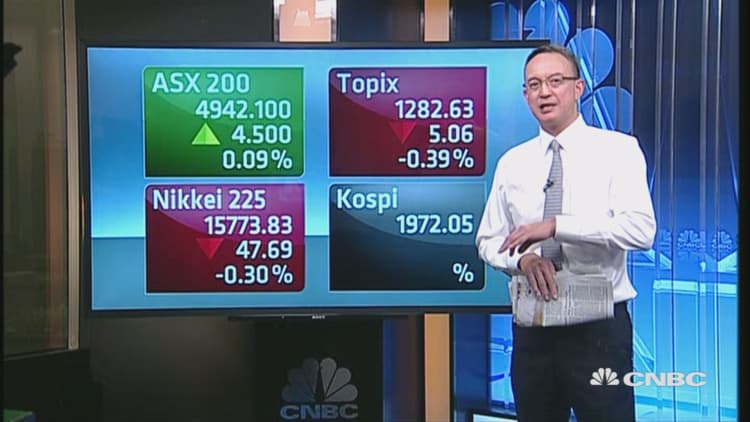
Asia markets retraced some of their morning losses on Monday, but a strong yen continued to weigh Japan's shares even as a reading on China inflation helped to bolster mainland stocks.
Japan's retraced losses of over 1.3 percent to close down 70.39 points, or 0.44 percent, at 15,751.13. Across the Korean Strait, the Kospi finished down 1.68 points, or 0.09 percent, at 1,970.37. In Hong Kong, the wavered between positive and negative territories before closing up 70.41 points, or 0.35 percent, at 20,440.81.
Australia's ASX 200 finished down 6.08 points, or 0.12 percent, at 4,931.53.
Chinese markets remained positive, with the adding 49.63 points, or 1.66 percent, to 3,034.59, and the Shenzhen composite closed up 38.15 points, or 2 percent, at 1,952.47.
Before the market open, China released its March inflation data. The consumer price index (CPI) rose 2.3 percent on-year in March, compared with a 2.5 percent forecast by a Reuters poll and in line with February's 2.3 percent on-year reading. Consumer inflation was down 0.4 percent on-month. The producer price index (PPI), meanwhile, declined on-year for the 49th consecutive month, down 4.3 percent, but at a slower rate of decline than in February.
Analysts said that the relatively benign data suggested policymakers on the mainland would continue to ease policy.
In the currency market, the Japanese yen broke the 108 handle, with the dollar/yen trading at 107.76 Monday afternoon, compared with Friday's close at 108.03.
Major exporters in Japan mostly sold off on Monday, with shares of Toyota dropping 3.46 percent, Nissan down 1.69 percent and Honda off 2.08 percent. Shares of Sony, however, added 3.73 percent.
A stronger yen is a negative for exporters because it reduces their overseas profits when converted into local currency.
The yen's relative strength against the greenback has led many analysts to speculate on whether the Japanese authorities might intervene in the market. But some questioned whether intervention would help much at all, potentially leaving policymakers with few tools to address the currency's rise.
Boris Schlossberg, managing director of foreign exchange strategy at BK Asset Management, explained in a note late last week that much of the decline in the dollar/yen pair "may be blamed on dollar weakness rather than yen strength as [the] Fed's reticence to tighten policy has driven U.S. yields lower, compressing much of the gap between the two currencies."
Schlossberg added that any intervention from the Bank of Japan (BOJ) could prove to be problematic if U.S. rates continue to fall in tandem.
"For dollar/yen to see any sustained support, U.S. yields would need to stabilize and begin to rise again and Bank of Japan may be waiting with its teeth clenched for the Fed to act," he said.
The dollar index, which measures the dollar against a basket of currencies, was at 94.11 as of 3:10 p.m. HK/SIN time. On Friday, the index finished at 94.23.
Elsewhere, the Australian dollar traded at $0.7542 in the evening local time.
The Chinese yuan traded nearly flat against the dollar, with the pair at 6.4675. Before market open, the People's Bank of China set the yuan midpoint rate at 6.4649 to the dollar; China's central bank lets the yuan spot rate rise or fall a maximum of 2 percent against the dollar relative to the official fixing rate.
In company news, shares of Samsung Engineering gained 6.36 percent. On Monday, Nomura issued a note upgrading the stock to Buy from Reduce. Analysts Jaehyung Choi and Michael Na said in the note they expect a turnaround in the company due to Samsung Group's "efforts to normalize operations, with JY Lee (its vice-chairman) taking a stake of potentially up to 5 percent." Normura added they do not expect further losses from problem projects in the backlog and extensive restructuring.
"We believe the worst is over after Samsung Engineering's restructuring and capital-raising, and we expect value accretion to rise," the analysts said.
In October, Reuters reported Samsung Engineering booked a 1.5 trillion won ($1.3 billion) operating loss in the third quarter and also flagged the sale of its headquarters building.
In the commodities market, oil prices retreated in the afternoon, retracing a morning advance. U.S. crude futures fell 0.96 percent to $39.34 a barrel, while global benchmark Brent shed 0.93 percent to $41.55 as of 3:23 p.m. HK/SIN time.
"The oil price is clearly in a very volatile state in the lead up to the oil producers meeting on 17 April," wrote Angus Nicholson, a market analyst at IG in a morning note. "Optimism about a potential deal [is] adding buoyancy to the spot price."
Data released last week showed some decline in crude inventories, which, Nicholson said, added "some positive fundamental developments to the deal-induced oil price speculation." If the oil price buoyancy continues in the lead up to the oil producers' meeting, it "is going to be a major positive in the equity space," he said.
Energy plays were mixed, with Santos adding 3.13 percent, Woodside Petroleum closing up 0.44 percent and mainland shares of China Petroleum up 1.44 percent. Shares of Inpex, however, slipped 0.2 percent.
Major U.S. indexes made slight gains on Friday, with the closing up 0.2 percent, the S&P 500 adding 0.28 percent and the composite higher by 0.05 percent.


